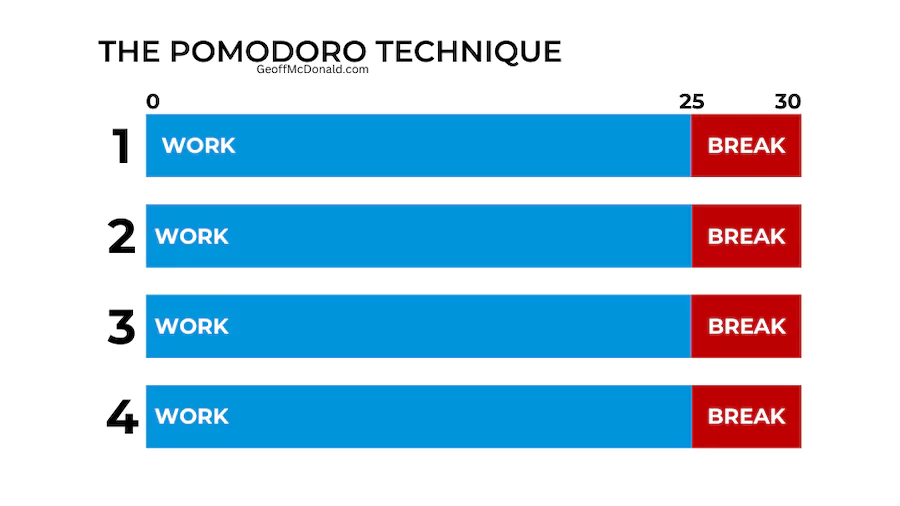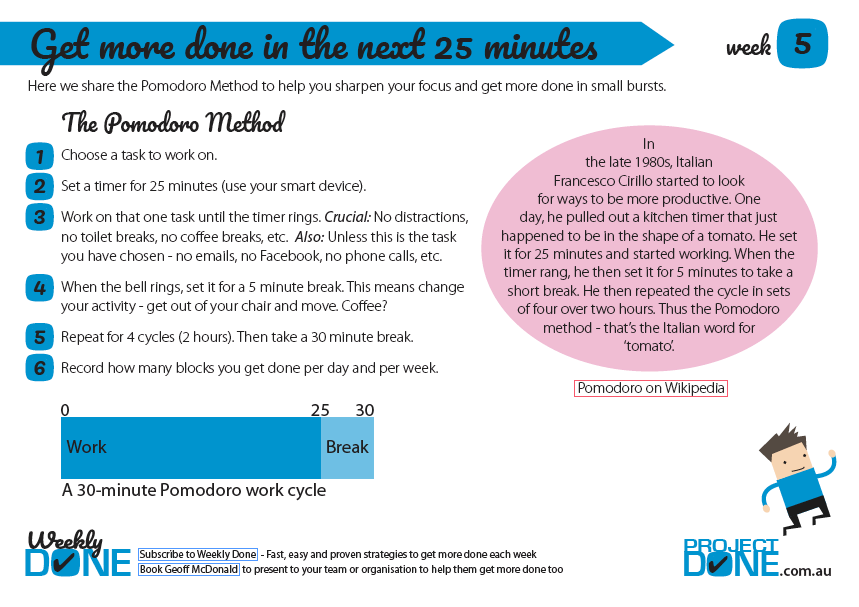Did you know that using the Pomodoro Technique can increase your productivity by up to 25%? If that was true, that would make it the greatest productivity hack. Imagine what you could accomplish with a boost like that.
The Pomodoro Technique Challenge
Lately, I’ve been struggling with distractions and procrastination. And that means I’m not getting things done and I’m feeling frustrated. Sound familiar? I decided it was time to change this. So I’m going to try out the Pomodoro Technique for 30 days.
Are you struggling to stay on top of your tasks and deadlines? This Pomodoro Method Challenge might be just for you.
What is the Pomodoro Technique?
The Pomodoro Technique is all about this (tomato) In the late 1980s, Italian Francesco Cirillo started to look for ways to be more productive. One day, he pulled out a kitchen timer that just happened to be in the shape of a tomato. He set it for 25 minutes and started working. When the timer rang, he set it for 5 more minutes to take a short break. He then repeated the cycle in sets of four over two hours. And this became the Pomodoro Method (Technique).
The 30-Day Pomodoro Challenge
The Pomodoro Challenge is to perform 4 sets of Pomodoros every day for 30 days. That’s two hours of focus. Or four 25-minute sessions with a five-minute break in between.
To complete the challenge you’ll need to choose an activity to undertake during this time. For example:
- Write: a book, blog posts, and video scripts
- Design: infographics, logos, websites
- Practice: playing the saxophone, doing exercise, meditation
- Creating: Art, recording videos, making furniture
- Social: make sales calls, attending events, meeting with others
My goal is to write for two hours every day. This will include book writing, blog posts, video scripts, email newsletters and LinkedIn posts. That’s six hours of writing in total. And that means I’m adding two hours of writing on top of all the other work I’m already doing every day.
My 30-Day Pomodoro Writing Challenge
Here are the highlights of my Pomodoro Writing Challenge…
Day 1
My first day was good. I got it done. But it wasn’t pretty. I didn’t realise how unfit I was for focused work.
By the third and fourth sessions, my focus and energy were starting to flag. I was starting to look at the timer every couple of minutes. And I kept thinking about all of those other things I wanted to do – time for coffee, checking my emails, what’s happening on the news, how is my YouTube channel going? But I did it. So that’s a tick.
Day 3
I’m pretty pleased with myself. I’m writing. And that feels good. Plus, I’m already starting to focus better. I find I’m getting through the 25 minutes without thinking about the timer and other things. Sometimes the timer goes off and it surprises me that the time is up. That happened much quicker than I thought it would.
Day 5
The whole point of the Pomodoro Technique is to focus and eliminate distractions. Once you set a task for 25 minutes you have to keep going on that task until the timer rings. For me, that means writing and nothing else. And I can’t take a toilet break, a coffee break or even answer the phone during that time. That’s been tricky – especially when my phone rings. I feel guilty not answering it. But I guess they can leave a message and I can call them later. That feels a bit selfish but I suppose this is what it is going to take to write my books.
Day 6
I didn’t want to write today. I just felt really tired. It felt like I was dragging my mind and filling in time rather than being productive. But it was my fault. I’ve been staying up watching the Tour De France which means I’m not getting enough sleep. If I wasn’t doing this challenge I probably would have skipped today’s session. I need to take my writing more seriously if I’m going to write all the books I want to.
Day 8
The big challenge I’ve faced is jamming in two hours of writing on top of everything else I’m doing. My decision to do that as my first activity of the day ensures it gets done. And everything else just falls in behind. And behind is the right word – I’m behind on my other work but I’m noticing that the important stuff gets done and the fluffy bits where I do pseudo-work (like watching YouTube videos) is dropping off. So some sort of new balance is forming which is good.
Day 12
I’m really finding these noise-cancelling headphones useful. Previously, I only used them when I was editing a video. But they’re great for blocking out a lot of distractions, like lawnmowers, traffic noise and barking dogs. I think I’ll keep using them for all my work.
Day 15
I feel like I’m getting momentum now. I’m feeling more focused. My energy levels have risen. And that’s also starting to flow into my other work – which is a great bonus. I feel like I’m winning.
Sometimes, how completing an activity makes you feel can be worth as much as the results you achieve.
Day 16
Today I had to change my schedule. I couldn’t do my writing first thing in the morning. I was tempted to skip it. But because I’d committed to do this challenge and make a video out of it I couldn’t lie. So I did it. And it worked okay. But there are more distractions in the middle of the day than at the start.
Day 22
I found myself a little forgetful today. I sat down to work and just started without putting on the timer. And I did this twice out of my four sessions. That’s not ideal. I simply estimated how long I had been working and reset the timer. But this does show that I’m building the habit of focused work. Which is the point of the exercise. The timer is merely an aid to help me do that.
Day 23
I’m feeling the benefit of the 5-minute breaks every half hour. I think this is a big reason the Pomodoro Technique is so effective. Normally, it’s too easy to just sit in your chair all day and not stand up and move. But worse, too often we stay sitting down and start clicking on social media and the news and email and YouTube. But that’s not a break for your brain. That’s more of the same – more screen time.
Day 27
One thing that doesn’t work so well with the Pomodoro session is that the timer will go off right in the middle of your train of thought. Sometimes it scares the bejesus out of you because you’re lost in your work. I found what worked was to write a note so I’d remember what I was thinking, take a break and come back to it.
Day 30
Yay! I did it. 30 days. I’m pleased with myself and my efforts. I’ve proven that I can focus and I can write every day.
What I learnt from my 30-Day Pomodoro Challenge
How I changed
The best way to describe how doing this Pomodoro Challenge has impacted me is that I feel like I’ve gone from jogging to sprinting. Before I was working like I was on holiday. Taking my time and doing a bit of this and a bit of that. But when you’re sprinting you have to focus. You go hard then you have a break. And I’ve built up my mental fitness to be able to do this consistently even over a couple of weeks.
What did I get done?
The big question is what did I get done during this time? I wrote for 30 days with 4 x 25-minute sessions. That’s 3000 minutes or 50 hours. I’ve written 8 video scripts. Reworked them into 8 blog posts. One 10-page ebook. 6 newsletters and 4 LinkedIn Posts. Plus I recorded and edited 8 videos. Plus I was able to service my clients and keep my business running at the same time. I’m rapped with those results.
The Best Part
But here’s the best part. My mood has changed. Previously, I was feeling flat and depressed that I wasn’t getting my Life’s Work done. Now I’ve proven to myself that I can. And I am making progress. Plus, I’m making more progress because I’m feeling better about myself and my work.
This confirms my thought that I was feeling flat because I wasn’t living up to the standards I’d set for myself. But when I do eg write every day, I feel better about myself.
The Big Surprise
One more big thing happened that was a complete surprise. Every day I wrote I had 3 5-minute breaks. In one of those breaks, I made myself a cup of coffee. But in the other two breaks, I did a 5-minute kettlebell routine. That’s 60 sessions in total. Now I feel like Superman. I feel strong and my muscles are pumped. It’s like I had a bonus gym session every day. I didn’t see that coming when I started this challenge.
Would I do it again?
In this challenge, I only did the Pomodoro Technique for my writing in the morning. And that was only for two hours. I’m going to keep going with that for 2 hours every day. But I’m already starting to wonder how much I’d get done if I did it for 4 hours of writing. That might be next.
There’s an old saying for marathon runners, never ask them if they’ll run another marathon as soon as they have finished one. But in this case, it wasn’t an ordeal that I would want to avoid. Instead, I was inspired by what I completed and what might be possible if I could keep doing it – let alone expand upon it.
Will the Pomodoro Challenge Work for You?
Is the Pomodoro Technique the greatest productivity hack? I think it might be. It’s a simple structure, costs nothing and the benefit grows as you do more of it.
Working in short sprints gets your energy up. Having one thing to focus on builds your attention and cuts out distractions. And having regular breaks refreshes your mind. If you want to get more done in less time, take on the challenge to do 2 hours of Pomodoro sessions every day for 30 days. You might be more productive than you ever imagined.
More on the Pomodoro Technique and Building Productive Habits
If you want to get more done and boost your productivity, read these posts next:





